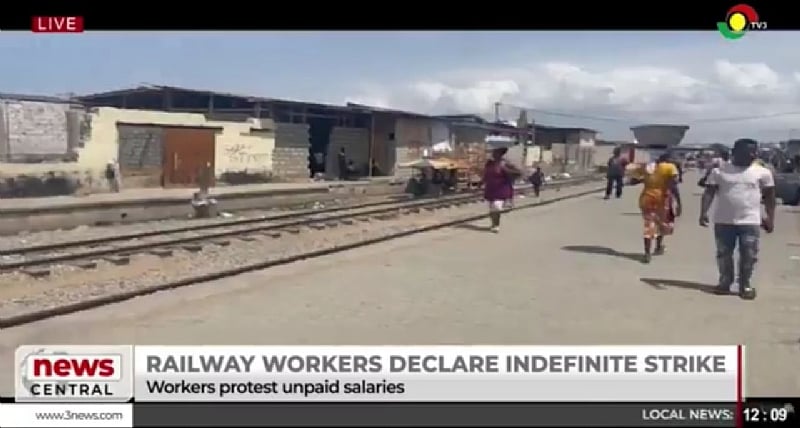The Ghana Railway Company finds itself embroiled in a crippling nationwide strike, the consequence of seven months of unpaid salaries. This financial drought has plunged hundreds of railway workers into dire straits, forcing them to grapple with mounting debts, familial discord, and the erosion of their basic dignity. The industrial action has brought train operations to a complete halt, highlighting the urgent need for government intervention and a resolution to the protracted salary crisis. The workers’ plight underscores the devastating impact of economic hardship on individuals, families, and the broader functioning of essential services. Their desperate pleas for assistance paint a stark picture of financial insecurity and the human cost of institutional failure.
The workers’ testimonies reveal the depth of their suffering and the ripple effects of the unpaid salaries. From the union chairman, Acheampong Justice, who announced the strike as a last resort to bring attention to their plight, to the individual narratives of hardship, the workers’ stories paint a grim picture of their daily struggle for survival. Nii Lartey, an electrician, shared the heart-wrenching account of his wife leaving him due to his inability to provide for their nine children. His story exemplifies the devastating impact of financial insecurity on family stability. Other workers echoed similar sentiments, expressing their anxieties about providing for their families and the humiliation of being debtors in their own communities. The lack of consistent income has stripped them of their ability to meet basic needs, pushing them further into poverty and despair.
The plight of Kwaku Mensah, a Principal Supply Officer on the cusp of retirement, adds another layer of tragedy to the unfolding crisis. After dedicating over four decades of his life to the railway company, he faces the prospect of retiring with a meager savings of 14,000 cedis, a sum insufficient to cover even the most basic expenses. His story highlights the broken promises of a system that has failed to adequately compensate its long-serving employees, leaving them vulnerable and insecure in their old age. The fact that he cannot even afford to buy ice water with his own money underscores the depth of his financial despair.
Grace Amihere, an employee in the Accounts Department, provides a poignant account of the social isolation that accompanies financial hardship. The inability to contribute to family funerals or participate in social gatherings has severed her connections to her community, further compounding her sense of isolation and despair. Her experience demonstrates how financial insecurity can erode social bonds and lead to social withdrawal, creating a vicious cycle of hardship and isolation. The workers’ stories collectively paint a picture of a workforce teetering on the brink, struggling to maintain their dignity and provide for their families.
The systemic issues plaguing the Ghana Railway Company are further highlighted by the branch chairman’s statement. His revelation that his salary after 35 years of service is less than 1,500 cedis underscores the inadequate compensation structure within the organization. This, coupled with the fact that 960 employees have not been paid, reveals a deep-seated financial crisis within the company. The chairman’s assertion that retirement within the company is disappointing reflects a widespread sense of disillusionment and betrayal among the workforce. The long-standing nature of these issues points to a failure of management and oversight, leaving the workers feeling abandoned and undervalued.
The ongoing strike has brought the Ghana Railway Company to a standstill, impacting not only the workers and their families but also the wider community that relies on rail services. The pressure is mounting on government officials to intervene swiftly and provide concrete solutions to the salary crisis. The workers’ demands are not merely about financial compensation; they are about basic human dignity, the right to provide for their families, and the expectation of a fair return for their labor. The future of the Ghana Railway Company, and indeed the well-being of its workforce, hinges on the government’s ability to address these concerns promptly and effectively. The continued inaction risks exacerbating the crisis and further eroding the trust between the workers and the institutions meant to protect their interests. This situation serves as a stark reminder of the crucial role of government in safeguarding the rights and well-being of its citizens and the importance of ensuring fair labor practices and adequate compensation for all workers.














